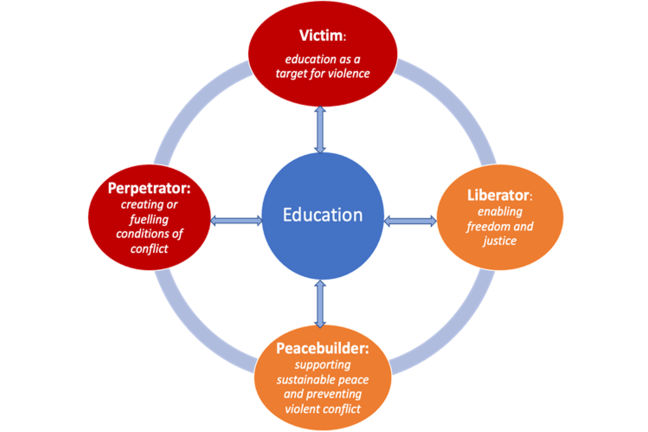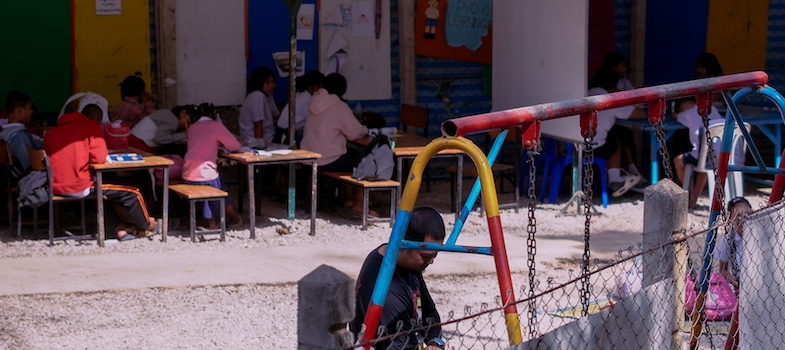2.2 Education in settings of conflict and displacement

Education in settings of conflict and displacement
Beyond its practical benefits in situations of conflict and displacement outlined in Unit 1, education has a wider role in economic, political and social change in societies.
Decisions about education, such as the language of instruction, the curriculum, and accreditation of learning are inherently political. This means that educators, children and the processes of education are situated within the wider or ‘macro’ context of the society. This macro context refers to things like political disagreements and unequal power relations between different groups. It also involves contested historical narratives, cultural and geographical diversity, and unequal distribution of resources and opportunities for different groups.
In this step, we will think about:
- how educational decisions impact on what children learn,
- how children’s identities are shaped through education,
- what kind of knowledge is valued, and
- what kind of futures children can imagine through their experiences in education.
Policies around these issues are often contested, and policies can have implications for whether education fuels conflict or promotes peace and social transformation. Because teachers have enormous power in shaping the futures of their learners, it is important that they are critically aware of the politics of education.
The diagram above shows some of the different ways in which education can be characterised in conflict-affected contexts.
The VPLP Framework: education as Victim, Perpetrator, Liberator, Peacebuilder
Education as a victim of conflict
Education is often disrupted when violent conflict breaks out. Teachers and children are scared to attend schools due to the fear of being caught in the crossfire, or sometimes due to the deliberate attacks on them by armed groups and armed forces. Schools are targeted by armed groups to undermine the political authority of the state. In some contexts, the state security forces attack schools that are run by oppositional political authorities. Schools are often used for mass gatherings for political activities and for campaigns to mobilise support for resistance. Additionally, security forces may occupy school premises while they are fighting insurgency. These risks cause school closures and loss of school days and learning.
Education as a perpetrator of violence
Education can also play a negative role by fuelling conflict and reproducing conflict drivers. For example, education systems that are exclusionary and insensitive to the social and cultural diversity of the community can fuel discontent among some groups who feel neglected and discriminated against. Unequal distribution of education opportunities, promotion of biased histories and stereotypes of minority ethnic and cultural groups, and repression of language, culture and history of minority communities can fuel grievances and armed resistance. Education is also used as political indoctrination, hatred against some groups, and as a justification for oppression and violence.
Education as a liberator
Education can enable students to learn about their positions in society through exposure to the curriculum, critical reflection on their lived experiences and interactions with their fellow learners. Educational processes that are designed to facilitate critical thinking, creativity and imagination for a better future can help learners develop critical consciousness about the social, political and economic conditions within which they live. Through this awareness, they are empowered to participate in political processes and exercise their agency to enable change in their society. They engage in critical dialogue with fellow members of the society and participate in social action that aims to redress injustices. This view of education sees education as a human right and an enabler of other rights. These rights include the right to freedom of speech, to cultural expression, to health care, to participation in decision-making bodies, and the right to access other basic services. Education is seen as a vehicle for creating a society that upholds human rights and promotes gender equality and peace with justice.
Education as a peacebuilder
Equitable and inclusive education enables learners to better understand their social world, obtain economic opportunities for stable livelihoods, and actively participate in political processes that influence their lives. Educational training for political leaders and peace negotiators can build knowledge and skills for dialogue, discussion, mediation and human rights education. Teaching and learning about peace in schools is beneficial to improve children’s understanding of differences and how to deal with disagreements in a non-adversarial manner. Reforms in education systems to increase access and quality of learning for historically marginalised communities can re-establish hope for a better society, resulting in peaceful means of dealing with wider societal problems. When education policies and curricula are decided in a participatory manner by involving representatives from diverse cultural groups, they are more likely to ensure recognition of different identities, languages and histories in the educational provision. Teachers can play a crucial role in promoting a culture of peace in schools and communities, and education can contribute to reconciliation between conflicting groups.
This CoMOOC considers education from a peacebuilding perspective. It is informed by theoretical knowledge in the field of education and conflict, which is combined with teachers’ knowledge, lived experiences and pedagogical skills in promoting meaningful learning. Our aim is to improve the life chances of their students who have been affected by conflict. A good quality education should always inspire learners to play a constructive role in building sustainable peace in their societies.
The Global Coalition for Protecting Education from Attack (GCPEA) publishes annual reports on attacks on education. You can look at this report if you want to find out more about the context you and others work in.
Over to you
Thinking about a context in which you are working, or you know well share your experience in the forum about:
- In what ways is education a victim, perpetrator, liberator and/or peacebuilder in your context?
- Why are schools often the target of attacks?
- What can teachers do to make education an opportunity for critical thinking and empowerment?
- What can teachers do to promote peacebuilding in their classrooms?
© UCL and the Inclusive Education Foundation (CoMOOCs Team), CC BY 4.0
See also
Global Coalition for Protecting Education from Attack (GCPEA)
The GCPEA publishes annual reports on attacks on education.
